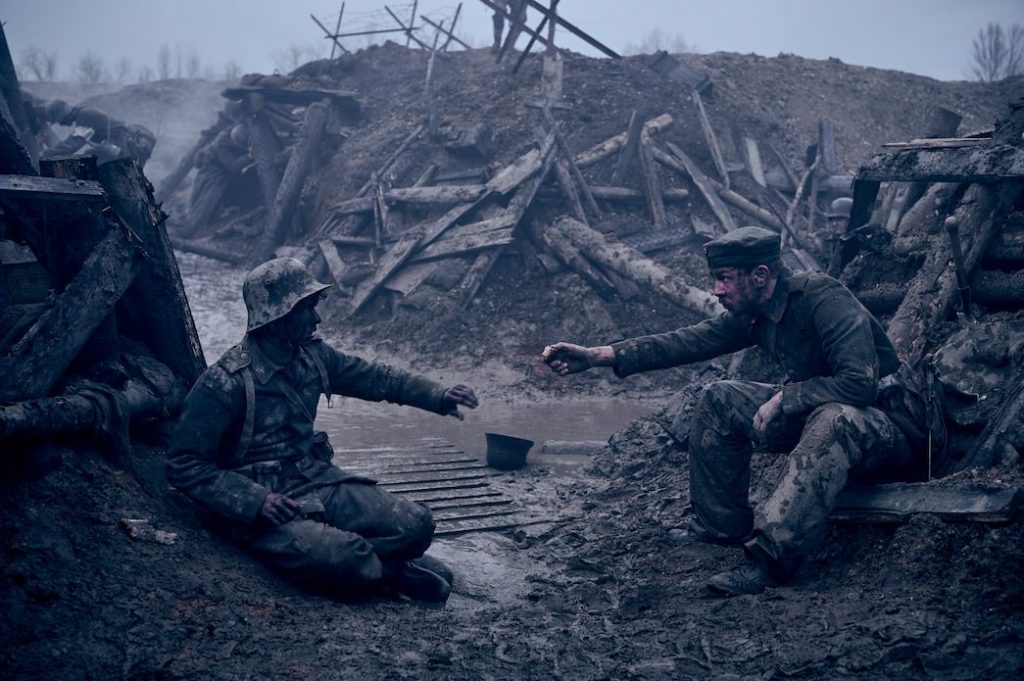Netflix’s All Quiet on the Western Front opens with an astounding five-minute cold open: in the French countryside, a German soldier known only as Heinrich is forced to climb out of his trench and charge, against gunfire and mortars, toward the enemy. As his comrades fall left and right, we don’t even see what happens to the faceless young man. After the title, we see Heinrich on top of a pile of dead bodies. The camera then follows his uniform: it is cleaned, repaired, and returned to Germany, then promptly handed over to the next wave of recruits.
This portrayal of the war machine, utterly indifferent to individual fates, perfectly captures the spirit of Erich Maria Remarque’s 1928 novel. The 17-year-old Paul Bäumer and his friends, blinded by their teachers’ nationalist propaganda, volunteer for the war. At the front, they experience boredom, terror, and the absolute senselessness of the slaughter. The final page of the book contains the moral (today, we would probably call it the “twist”): on the day Paul is killed, the daily report of the general staff says only, “Nothing new in the West.”
Unfortunately, the film does not stop after this brilliant intro. It goes on for two and a half more hours. The spectacular production captures the horrors of the war with overwhelming violence and also tiny details: when a mud-covered soldier steps into a puddle, the splashing water is dark red, revealing that these are pools of blood. The very modern soundtrack evokes dread. And Albrecht Schuch is Germany’s best actor.
While many of the characters are the same — we meet Paul, Frantz, Kat, Tjaden, and so on — the filmmakers decided to “improve” the story, changing it beyond recognition. We are supposed to see the war from the perspective of individual soldiers. All their suffering is “nothing new.” But the film is set in the final days of the war, and the battle scenes are interspersed with the armistice negotiations. The scenes of high politics include genuine historical figures like the liberal politician Matthias Erzberger, and as well as fictional composite figures like the general Friedrich.
This was probably intended to add historical context for an audience that, unlike Remarque’s readers, won’t remember what happened in 1918 too well. But owing to this change, Paul’s travails are no longer situated in the endless slog of trench warfare. No, the story now takes place at the war’s most consequential moment.
How did World War I end? Netflix would have us believe it was thanks to the bravery of liberals like Erzberger, who is shown imploring the generals to cease the slaughter: “Over 40,000 killed in the last few weeks alone!” he proclaims with a sigh. In reality, though, Erzberger was an enthusiastic supporter of the carnage for years — he personally campaigned for German annexations. It was only in 1917 that he realized, after the U.S. had entered the war, that Germany had no chance of winning. In other words, Erzberger was just a pragmatic imperialist and chauvinist. He was in favor of mass slaughter as long as there was a realistic possibility that German capital would profit from it — and he wanted peace once the balance of forces turned against his side. No wonder today’s liberal bourgeois love him.
Omitted from this film is what actually ended the war: the November Revolution. A massive workers’ revolution began with a sailors’ revolt on November 4, 1918, and quickly spread across Germany. This film mentions briefly that the kaiser abdicated, but it offers no explanation of what caused Wilhelm II to do so. On November 9, the kaiser’s palace in Berlin was surrounded by hundreds of thousands of workers during a general strike and insurrection. The revolutionary fervor shook the entire army and navy. The hours-long film references this in a single line about “soldiers refusing to follow orders.”
The story’s new ending is bizarre. Hours before the armistice is set to take effect, General Friedrich orders Paul and his regiment to attack the French lines. This is a case of “dangerous half knowledge” (as a German idiom puts it): a Netflix writer must have heard about a genuine historical incident without quite understanding it. As the end of the war came into sight, at the end of October 1918, the German navy’s high command ordered some 80,000 sailors to head out to sea for a final — and hopeless — battle against the British fleet. What happened next is crucial: the sailors refused. They arrested their officers and raised red flags on their ships. This event, known as the Kiel Sailors’ Mutiny, was the start of the revolution.
This was the situation throughout the military, and the officers understood that well. In the film we learn that the head of Germany’s Army High Command, Paul von Hindenburg, was pressing Erzberger to sign the capitulation. Why? The film offers no explanation. In his memoirs, Hindenburg recalled being told at the end of September that “revolution was at the door” in Germany if the war continued.
If we imagine a situation like the film’s conclusion, in which Paul and his comrades are ordered to go on a suicidal and senseless assault during the final minutes of the war, we can be pretty sure what would have happened. The soldiers would have taken their guns and shot the general before heading home to fight for a revolution and get rid of everyone responsible for such an inconceivable slaughter. Instead, director Edward Berger wants us to think Paul would keep killing on command — the war has apparently turned him into a murderous psychopath incapable of anything but attacking French soldiers. While the novel wanted us to empathize with its everyman hero, the film’s conclusion makes that impossible.
In a time when trench warfare has returned to Europe, All Quiet on the Western Front is more relevant than it’s been for a long time. But the point of the book is that soldiers are not mindless automatons who are condemned to suffer and kill and die until liberal politicians save the day. It’s the opposite: soldiers and the working class in general can end capitalist slaughter and create a new world. I am currently reading the excellent autobiography of Fritz Zikelsky,1Fritz Zikelsky, Das Gewehr in meiner Hand. Erinnerungen eines Arbeiterveteranen (Berlin: Verlag des Ministeriums für Nationale Verteidigung), 1959. who was drafted into the German army in World War I. He describes the same horrors — but also how the troops increasingly fought back against their officers, until finally disarming them. This kind of real history is what we need up on the silver screen. But I wouldn’t expect it from Netflix.
Notes
| ↑1 | Fritz Zikelsky, Das Gewehr in meiner Hand. Erinnerungen eines Arbeiterveteranen (Berlin: Verlag des Ministeriums für Nationale Verteidigung), 1959. |
|---|











